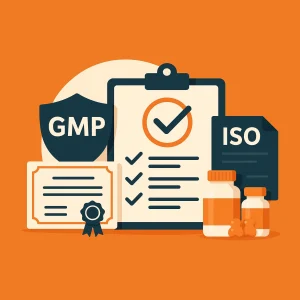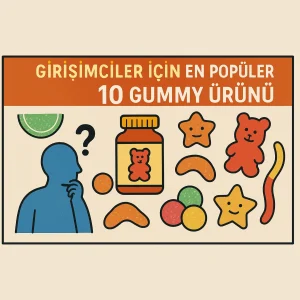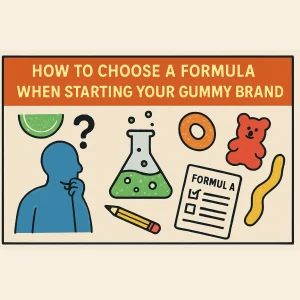The Supplement Boom in Europe
Over the past decade, Europe has become one of the fastest-growing regions in the health and wellness sector. The European population is aging, life expectancy is increasing, and the concept of “healthy aging” is becoming more important across society. At the same time, younger generations have embraced the idea of preventive health as part of their daily lifestyle. Vitamins, probiotics, collagen, and herbal supplements are no longer just for illness periods but have become part of everyday routines for energy, immunity, and beauty.
Within this massive market, gummy-format supplements are experiencing remarkable growth. Thanks to their familiarity with the confectionery culture, ease of use, and appeal as an alternative to capsules or tablets, European consumers are increasingly drawn to gummies each year. For example, between 2022 and 2025, the European gummy market is projected to grow at an annual rate of over 10%. This trend creates a wealth of opportunities for both established brands and new entrants.
However, the European market is not only defined by high demand but also by strict regulations, quality standards, and discerning consumer expectations. Entrepreneurs looking to enter this market must take the right steps in both certification and strategic positioning.
- Market Size and the Rise of the Gummy Trend
As of 2023, the dietary supplement market in the European Union has surpassed €20 billion. Germany, France, Italy, and the United Kingdom are the largest players, but Eastern European countries have also shown strong growth in recent years.
The rise of gummies is directly tied to shifting consumer behavior:
- Many European consumers dislike swallowing tablets or capsules—particularly children and the elderly.
- Fun, candy-like, portable formats are preferred.
- With the growing wellness trend, “sugar-free” and “plant-based” gummies are in higher demand.
For instance, gummy vitamin sales in Germany have increased by more than 70% over the last five years. In the UK, more than half of children’s vitamins are now sold in gummy form. This clearly shows a gap in the market that new brands can take advantage of.
- European Consumer Expectations: Beyond the Product
Europe’s consumer base is not only large but also highly conscious and demanding. Producing a tasty gummy is no longer enough—brands must meet consumer expectations across the entire value chain.
2.1. The Clean Label Demand
The “clean label” movement is growing fast in Europe. Labels must be transparent, easy to understand, and contain minimal additives. Claims such as gluten-free, sugar-free, vegan, and non-GMO play a critical role in purchasing decisions.
2.2. Vegan and Plant-Based Alternatives
In Northern Europe especially, animal-derived gelatin is being replaced with pectin or agar-agar. Vegan consumers expect plant-based formulas in gummy supplements.
2.3. Packaging and Sustainability
Environmental awareness is extremely high in Europe. With ongoing initiatives to reduce plastic use, recyclable, biodegradable, or glass packaging is becoming a consumer preference—even packaging choices can influence buying decisions.
2.4. Sugar and Sweetener Sensitivity
The EU continues to run campaigns to reduce sugar consumption. This is driving demand for low-sugar or sugar-free gummies, often sweetened with natural alternatives like stevia.
For brands, this means not only formulating the right product but also shaping their brand story, production methods, and packaging to align with European values.
- Regulations in Europe and the Role of EFSA
The European market is as challenging as it is attractive, due to strict regulatory frameworks and controls on health claims.
3.1. What is EFSA?
The European Food Safety Authority (EFSA) evaluates the safety of all ingredients used in supplements. Any claim on packaging such as “supports immunity” or “boosts energy” must be pre-approved by EFSA.
3.2. Labeling Requirements
Labels must:
- Clearly list all ingredients, additives, and allergens.
- Specify the recommended daily dosage.
- Avoid misleading or unverified health claims.
3.3. Import and Customs Procedures
Brands looking to export products into the EU often need to present GMP and ISO 22000 certifications. Additionally, each country may have its own Ministry of Health approval processes. For example, France requires additional permits for supplements, while Germany requires registration with local food authorities.
- Distribution Channels: How to Sell Gummies in Europe
The key to entering the European market lies in choosing the right distribution strategy.
4.1. Pharmacies and Parapharmacies
In countries like France, Germany, and Italy, pharmacies remain the strongest sales channel for supplements. GMP and ISO certifications are mandatory to be stocked on these shelves.
4.2. Online Sales Platforms
Platforms like Amazon Europe, Zalando, and Douglas show strong consumer demand for gummy supplements. However, these platforms require documentation and safety certifications for listing products.
4.3. Retail Chains
Chains such as DM and Rossmann in Germany, Boots in the UK, and Etos in the Netherlands serve as powerful mass distribution channels. To work with these retailers, products must meet certification requirements and remain price-competitive.
- Opportunities for Turkish Manufacturers
Turkey is strategically positioned to capture opportunities in the European gummy market, thanks to its geographical proximity, strong production capacity, and competitive costs.
5.1. Contract Manufacturing and Private Label
Many European brands prefer to outsource production to Turkish manufacturers with GMP and ISO-certified facilities. This provides cost efficiency and faster market entry.
5.2. Export Potential
Through the customs union with the EU, exporting supplements from Turkey to Europe is relatively seamless once the necessary certifications are obtained.
5.3. Innovative Product Range
Turkish producers are developing more than just standard multivitamin gummies—they also offer probiotics, collagen, melatonin, herbal extracts, and functional blends. This product variety allows entry into Europe’s niche markets.
- Strategic Recommendations for Market Entry
For entrepreneurs aiming to expand into Europe, the following factors are critical:
- Choose the right manufacturer: Work with GMP and ISO-certified producers with export experience.
- Develop localized formulations: Tailor products to market-specific trends—sugar sensitivity in Germany, natural content in France, vegan preferences in Scandinavia.
- Brand positioning: Emphasize trust, transparency, and sustainability in messaging.
- Build a distribution network: Focus on a multi-channel approach—online, pharmacies, and retail stores.
- Manage legal compliance: Use only EFSA-approved health claims and secure country-specific permits.
Conclusion: The European Gummy Market as a Golden Opportunity
Europe represents one of the most dynamic and high-potential regions in the global supplement industry. Gummies, in particular, are experiencing rapid growth driven by evolving consumer preferences. But success in this market requires more than just creating a good product—it demands GMP and ISO certifications, compliance with EFSA regulations, and strategic distribution.
For Turkish manufacturers, this represents a major opportunity. With geographical advantages, competitive pricing, and advanced production capabilities, Turkey is well-positioned to become a key supplier to Europe’s gummy market.
For entrepreneurs looking to build their own brand, the most important message is this: success in Europe is built on trust. And the foundation of trust lies in certified, high-quality, and consumer-centric production. For brands aiming to expand into the gummy world, now is the perfect time to seize the European opportunity.






